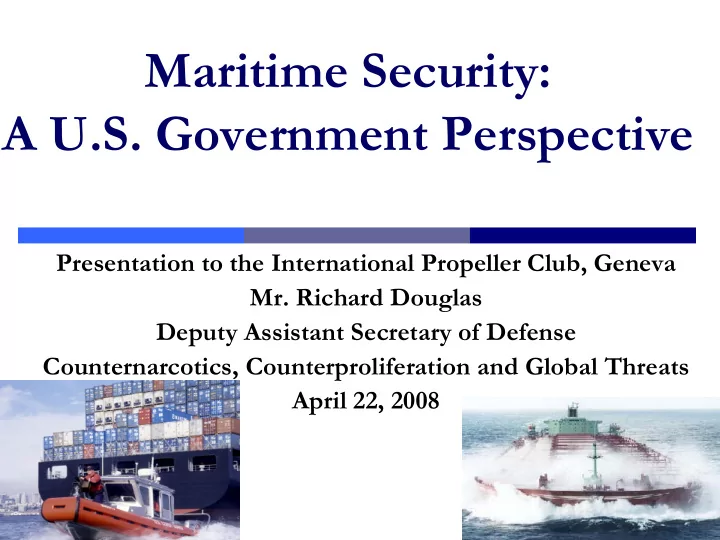

Maritime Security: A U.S. Government Perspective Presentation to the International Propeller Club, Geneva Mr. Richard Douglas Deputy Assistant Secretary of Defense Counternarcotics, Counterproliferation and Global Threats April 22, 2008
Maritime Security Issues - Agenda � 2005 Protocols to the Suppression of Unlawful Acts (SUA) at Sea Convention � Proliferation Security Initiative (PSI) � Maritime Domain Awareness � Maritime Security Challenges and Opportunities
Working together on common interests � Prevent legitimate commercial routes and the global supply chain from being exploited by proliferators for nefarious or unlawful purposes. � Minimize the disruption of legitimate cargo flows. � Integrate public and private maritime security activities to: − Preserve freedom of the seas; − Facilitate commerce; and, − Prevent use of the “world’s highways” for unlawful activities.
SUA Convention � The 1988 SUA Convention entered into force in 1995. − Focus on acts of terrorism that endanger the safe navigation of ships. − SUA has 90 parties, including all PSI participants. � Requirement to extradite or prosecute alleged offenders – SUA requires parties to criminalize offenses set out in the treaty.
SUA – 2005 Protocols • States Parties will criminalize under their domestic laws certain acts, including: • Using a ship in a terrorist activity. •Transporting WMD, including dual-use technology. • Transporting terrorist fugitives States should ratify now. � The protocols provide legal predicate to interdict materials. � When implemented states will have clear legal authority to detain and prosecute individuals under their domestic laws.
SUA – 2005 Protocols � Ratification is encouraged, the new protocols will provide tools to prevent proliferation of WMD and related materials, − States ratifying SUA demonstrate their commitment to strengthening national and international legal authorities to effectively impede proliferation and deter terrorist acts at sea . � When implemented states will have clear legal authority to detain and prosecute individuals under their domestic laws. � The shipboarding provisions are based upon flag-state consent, and will facilitate quick “real-time” interaction on boarding requests.
PSI: A History � The Proliferation Security Initiative (PSI) was launched in May 2003 as a cooperative framework to coordinate national actions supporting interdiction − PSI began with 11 like-minded states; 85+ countries now support PSI � PSI Principles represent a commitment to act against proliferation-related shipments to or from states or non-state actors of proliferation concern − Supports action in the sea, air, and on land − Brings to bear multiple elements of national power (e.g., diplomacy, law enforcement, intelligence, and military) − Consistent with national legal authorities and international law PSI: An Activity, Not an Organization
PSI and interdiction: Unique nonproliferation tool s � Nonproliferation treaties only affect member states and assume those member states will honor their obligations… � Export controls are applied by individual states…but − Interdiction focuses on states that do not implement effective export controls and cases where controls are circumvented � Interdiction adds a new tool to deter both suppliers and customers by… − Making proliferation more costly and more difficult − Revealing covert proliferation behavior − Facilitating “enforcement” of UN Security Council Resolutions “There is a consensus among nations that proliferation cannot be tolerated. Yet this consensus means little unless it is translated into action.” - President George W. Bush, February 2004, National Defense University
US PSI Shipboarding agreements � PSI bilateral shipboarding agreements establish a streamlined means to obtain flag-state authorization to board sea vessels suspected of carrying WMD-related shipments � They facilitate bilateral cooperation by establishing agreed- upon procedures to board and search such vessels in international waters � The U.S. currently has 8 bilateral shipboarding agreements in place with: Belize, Croatia, Cyprus, Liberia, Malta, Marshall Islands, Mongolia, and Panama � PSI shipboarding agreements complement SUA, and provide for effective bilateral cooperation while the SUA process moves forward.
PSI governments seek industry support � Most proliferation-related trafficking occurs via commercial channels � Participants in all stages of the international supply chain occupy a unique vantage point over international trade flows − Shipping companies (e.g., container lines, freight forwarders, and brokers) are uniquely qualified to identify potentially suspicious transactions − Industry cooperation can deter proliferators from using unwitting commercial vendors and reduce disruption/costs of interdictions � PSI governments are opening dialogue with key industry segments on interdiction Aug 2004 - Shipping Container Security Worksh Copenhagen, Denmark Sept 2005 - Air Cargo Industry Workshop Los Angeles, United States Apr 2006 - Exercise TOP PORT, Netherlands Industry input on exercise scenarios Sept 2006 - Maritime Industry Workshop London, U.K.
Maritime Domain Awareness � Developing a common operating picture that is accurate and dynamic. � IMO – Long Range Identification and Tracking; − Amendment to the SOLAS Convention. − Means for Flag, port and coastal states to track vessel traffic by means of an electronic transmitter (not limited to line of sight as with AIS) − Ships would transmit data within 1000m of port or coast, or within 96-hours transit from port of coast. − IMO is developing implementation architecture and governance.
Maritime Security Challenges and Opportunities � Piracy. � International Ship and Port Facility Security (ISPS) Code Compliance. � Global Maritime Partnership. � Freedom of Navigation
Questions?
Recommend
More recommend